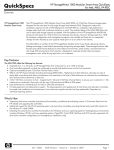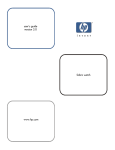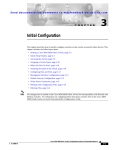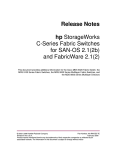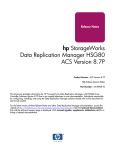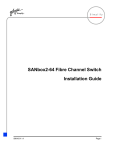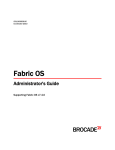Download HP C-Series User's Manual
Transcript
Application Notes hp StorageWorks Fabric Interoperability: Merging Fabrics Based on C-Series and B-Series Fibre Channel Switches Eleventh Edition (December 2007) Part Number: AA-RV1ZL-TE This document summarizes. the steps required to merge two SAN fabrics, where one is constructed with C-Series SAN switches and the other is constructed with B-Series SAN switches For the latest version of these Application Notes and other SAN fabric interoperability documentation, access the HP storage web site at: http://www.hp.com/country/us/eng/prodserv/storage.html. © Copyright 2004, 2007 Hewlett-Packard Development Company, L.P. Hewlett-Packard Company makes no warranty of any kind with regard to this material, including, but not limited to, the implied warranties of merchantability and fitness for a particular purpose. Hewlett-Packard shall not be liable for errors contained herein or for incidental or consequential damages in connection with the furnishing, performance, or use of this material. This document contains proprietary information, which is protected by copyright. No part of this document may be photocopied, reproduced, or translated into another language without the prior written consent of Hewlett-Packard. The information contained in this document is subject to change without notice. The only warranties for HP products and services are set forth in the express warranty statements accompanying such products and services. Nothing herein should be construed as constituting an additional warranty. HP shall not be liable for technical or editorial errors or omissions contained herein. Adobe® and Acrobat® are trademarks of Adobe Systems Incorporated. Intel® and Celeron® are U.S. registered trademarks of Intel Corporation. Intel® and Itanium® are trademarks or registered trademarks of Intel Corporation in the U.S. and other countries and are used under license. Intel® Itanium™ Processor Family is a trademark in the U.S. and other countries and is used under license. Microsoft®, MS-DOS®, MS Windows®, Windows®, and Windows NT® are U.S. registered trademarks of Microsoft Corporation. Oracle® is a registered U.S. trademark of Oracle Corporation, Redwood City, California. UNIX® is a registered trademark of The Open Group. Hewlett-Packard Company shall not be liable for technical or editorial errors or omissions contained herein. The information is provided “as is” without warranty of any kind and is subject to change without notice. The warranties for Hewlett-Packard Company products are set forth in the express limited warranty statements for such products. Nothing herein should be construed as constituting an additional warranty. Printed in the U.S.A. Fabric Interoperability: Merging Fabrics Based on C-Series and B-Series Fibre Channel Switches Application Notes Eleventh Edition (December 2007) Part Number: AA-RV1ZL-TE 2 Fabric Interoperability: Merging Fabrics Based on C-Series and B-Series Fibre Channel Switches Application Notes About this document About this document This section describes the content reflected in this document, including: ■ Application notes information, page 3 ■ Intended audience, page 3 ■ Other SAN interoperability documentation, page 3 Application notes information These Application Notes cover the following major topics: ■ Introduction, page 4 ■ How to read this document, page 4 ■ Check list for merging fabrics, page 5 ■ B-Series configuration steps, page 6 ■ C-Series configuration steps, page 10 ■ Merging fabrics and verification, page 13 ■ Expected behavior from Fibre Channel services, page 15 ■ Interoperability mode behavior summary by switch type, page 16 ■ Merging zones-examples, page 18 ■ Supported configuration rules and guidelines, page 24 ■ Troubleshooting, page 28 Intended audience This document is intended for customers who are considering merging SAN fabrics where one fabric is constructed with C-Series SAN switches and the other fabric is constructed with B-Series SAN switches. Other SAN interoperability documentation Other SAN interoperability documents include: ■ SAN Design Reference Guide ■ Fabric Interoperability: Merging Fabrics Based on M-Series and B-Series SAN Switches Additional documentation, including white papers and best practices documents, are available via the HP web site at: http://www.hp.com.. Fabric Interoperability: Merging Fabrics Based on C-Series and B-Series Fibre Channel Switches Application Notes 3 Introduction Introduction This application notes discusses the details on how to configure and merge HP C-series and B-series switches into a single standards based interoperable fabric. This document also provides information on supported configurations, expected behavior and any exceptions in the interoperability mode. How to read this document If you are going to configure and merge the C-series and B-series fabrics, read sections ■ Check list for merging fabrics, page 5 ■ Merging fabrics and verification, page 13 ■ Troubleshooting, page 28 If you are interested only in supported features, configurations and switch/os/storage system versions, read sections 4 ■ Expected behavior from Fibre Channel services, page 15 ■ Interoperability mode behavior summary by switch type, page 16 ■ Supported configuration rules and guidelines, page 24 Fabric Interoperability: Merging Fabrics Based on C-Series and B-Series Fibre Channel Switches Application Notes Check list for merging fabrics Check list for merging fabrics B-Series Complete the following steps before merging the fabrics: Step B1: verify switch firmware versions, page 6 Steps B2, B3: verify/configure switch domain IDs & verify switch/fabric default settings, page 6 Step B4: disable management server, page 8 Step B5: verify/configure fabric operating mode, page 8 Step B6: verify proper zoning configuration is in place, page 9 C-Series Complete the following steps before merging the fabrics: Step C1: verify switch firmware versions, page 10 Step C2: verify switch/fabric default settings, page 10 Step C3: verify the fabrics are in proper operating mode, page 11 Step C4: verify/configure switch domain IDs, page 11 Step C5: verify proper zoning configuration is in place, page 11 Fabric Interoperability: Merging Fabrics Based on C-Series and B-Series Fibre Channel Switches Application Notes 5 B-Series configuration steps B-Series configuration steps The following steps provide information on how to verify, configure B-series switches for Interoperability. While it is possible to accomplish this by using either the Fabric Manager or the embedded Web Tools or the CLI, the following steps use only CLI (telnet) for demonstrating this. Step B1: verify switch firmware versions Before merging the fabrics, make sure all the B-Series switches in the fabric have the right firmware version. See Table 2 for the supported firmware version to be used and update the switches if necessary. Login to the switch as an admin and verify firmware version using the telnet command “version”. Given below is an example. Switch: login Password: xxxxxxxx Switch:admin> Switch:admin> version Kernel: 2.4.19 Fabric OS: v4.1.1 Made on: Wed Jun 18 02:59:09 2003 Flash: Thu Sep 4 19:36:06 2003 BootProm: 3.2.4 Switch:admin> For firmware upgrade procedures refer to B-series Fabric OS Procedures Version 3.1.x/4.1.x User Guide available at: http://h18006.www1.hp.com/products/storageworks/fcsanswitch216/index.html Steps B2, B3: verify/configure switch domain IDs & verify switch/fabric default settings Ensure that all the switches between the two fabrics have unique domain IDs before they are merged. List the domain ID addresses of each switch in both the fabrics and verify there are no duplicate IDs. If any duplicate addresses exist, change the IDs by assigning different domain numbers. Given below is an example on how to change domain IDs on B-series switches. Use telnet session to perform the domain ID configurations. This requires disabling the switch temporarily, so plan accordingly. Switch:admin> switchdisable Switch:admin> Switch:admin> configure Configure... 6 Fabric Interoperability: Merging Fabrics Based on C-Series and B-Series Fibre Channel Switches Application Notes B-Series configuration steps Fabric parameters (yes, y, no, n): [no] y Domain: (1..239) [97] Å Select the domain ID in the range 97-127, if change is required BB credit: (1..27) [16] R_A_TOV: (4000..120000) [10000] Å Ensure this value is 10000, should be same for all switches in the fabric E_D_TOV: (1000..5000) [2000] Å Ensure this value is 2000, should be same for all switches in the fabric WAN_TOV: (1000..120000) [0] Data field size: (256..2112) [2112] Sequence Level Switching: (0..1) [0] Disable Device Probing: (0..1) [0] Suppress Class F Traffic: (0..1) [0] SYNC IO mode: (0..1) [0] VC Encoded Address Mode: (0..1) [0] Core Switch PID Format: (0..1) [1] Per-frame Route Priority: (0..1) [0] Long Distance Fabric: (0..1) [0] Virtual Channel parameters (yes, y, no, n): [no] Zoning Operation parameters (yes, y, no, n): [no] RSCN Transmission Mode (yes, y, no, n): [no] Arbitrated Loop parameters (yes, y, no, n): [no] System services (yes, y, no, n): [no] Portlog events enable (yes, y, no, n): [no] No changes. Switch:admin> Fabric Interoperability: Merging Fabrics Based on C-Series and B-Series Fibre Channel Switches Application Notes 7 B-Series configuration steps Step B4: disable management server It is required to disable platform management services fabric wide before enabling the interopmode and merging the fabrics. The following command when executed will deactivate the Platform Database Management Service of each switch in the fabric. Switch:admin> msPlMgmtDeactivate This will erase all Platform entries. Are you sure? no, n): [no] y (yes, y, Committing configuration...done. Request Fabric to Deactivate Platform Management services.... Done. Switch:admin> Note: It is required that you reboot the switch after executing this command. However, you may wait to reboot the switch until completing the next step (B5), so that rebooting multiple times can be avoided. Step B5: verify/configure fabric operating mode For B-Series switches the “interopmode 1” must be enabled before merging with C-series switches. This command enables interopmode on individual switches only and hence must be executed on all B-Series switches in the fabric. Use the following telnet command to change the operating mode. login: admin Password:xxxxxxxx Switch:admin> switchDisable Switch:admin> 0x101a8dd0 (tThad): Jan 20 10:47:55 WARNING FW-STATUS_SWITCH, 3, Switch status changed from HEALTHY/OK to Marginal/Warning Switch:admin> Switch:admin> interopmode 1 The switch effective configuration will be lost when the operating mode is changed; do you want to continue? (yes, y, no, n): [no] y Committing configuration...done. 8 Fabric Interoperability: Merging Fabrics Based on C-Series and B-Series Fibre Channel Switches Application Notes B-Series configuration steps cfgDisable: no EFFECTIVE configuration interopMode is 1 NOTE: It is required that you boot this switch to make this change take effect Switch:admin> fastboot Å reboots the switch quicker, bypassing POST Step B6: verify proper zoning configuration is in place Check for Duplicate Zone Sets (zones): To ensure proper zoning merge and operation, verify there are no duplicate active ZoneSets or Zones across the two fabrics that need to be merged. If any duplicate zones exist then rename them. The following telnet commands can be used to accomplish this. See B-series software manual for detailed explanation of these commands. ■ cfgShow ■ zoneCreate ■ cfgCreate Verify Proper Zone Naming Ensure that zone names adhere to the following guidelines. ■ All characters must be ASCII ■ A name must be between 1 and 64 characters in length ■ The first character of a name must be a letter. A letter is defined as either an uppercase [A-Z] or lower case [a-z] character ■ Any character other than the first character must be either a lower case character [a-z] or an upper case character [A-Z] or a number [0-9] or the symbol (_). Configure Zones using only PWWNs In the interoperability mode all the zone members must be defined using port WWNs only and defining them in any other way is not supported. For example, we can not define zones using FC port addresses or domain, port combinations etc. If there are any zones not defined as stated above, redefine them using proper PWWNs. Fabric Interoperability: Merging Fabrics Based on C-Series and B-Series Fibre Channel Switches Application Notes 9 C-Series configuration steps C-Series configuration steps The following steps provide information on how to verify, configure C-series switches for Interoperability. While it is possible to accomplish this by using either the Fabric Manager or the CLI, the following steps use only CLI (telnet) for demonstrating this. Step C1: verify switch firmware versions Verify all C-series switches are configured with the correct firmware version as shown in Table 3. If necessary upgrade the switches with the supported firmware and refer to the MDS 9000 Family Configuration Guide that can be accessed through the links provided at the URL below. http://h18006.www1.hp.com/products/storageworks/cmds9506/leavinghp-cisco.html MDS9509# show ver Cisco Storage Area Networking Operating System (SAN-OS) Software TAC support: http://www.cisco.com/tac Copyright (c) 1986-2002 by cisco Systems, Inc. Software kickstart: version 1.0(1) [build 1.0(0.260c)] [gdb] system: version 1.0(1) [build 1.0(0.260c)] [gdb] Hardware RAM 1932864 kB bootflash: 503808 blocks (block size 512b) slot0: 0 blocks (block size 512b) kickstart compile time: 11/7/2002 21:00:00 system compile time: 11/7/2002 20:00:00 Step C2: verify switch/fabric default settings It may be necessary to change the Fibre Channel timers as well if they have been changed from the system defaults. The MDS 9000 and B-series FC Error Detect (ED_TOV) and Resource Allocation (RA_TOV) timers default to the same values. They can be changed if needed. The RA_TOV default is 10 seconds, and the ED_TOV default is 2 seconds. Per the FC-SW2 standard, these values must be the same on each switch within the fabric. MDS9509 login: admin Password: xxxxxxxx MDS9509# show fctimer F_S_TOV : 5000 milliseconds D_S_TOV : 5000 milliseconds E_D_TOV : 2000 milliseconds R_A_TOV : 10000 milliseconds To modify these values, use the following commands. Note that these changes can not be made unless all VSANs in the switch are suspended. 10 Fabric Interoperability: Merging Fabrics Based on C-Series and B-Series Fibre Channel Switches Application Notes C-Series configuration steps MDS9509# config t MDS9509(config)# vsan database MDS9509(config-vsan-db)# vsan 1 suspend MDS9509# config t MDS9509(config)# fctimer e_d_tov 2000 <1000-100000> E_D_TOV in milliseconds(1000-100000) MDS9509(config)# fctimer r_a_tov 10000 <5000-100000> R_A_TOV in milliseconds(5000-100000) Step C3: verify the fabrics are in proper operating mode To enable interoperability mode on C-series switches, the first step is to place the VSAN of the E_Ports(s) that connect to the B-series in interoperability mode. MDS9509# config t MDS9509(config)# vsan database MDS9509(config-vsan-db)# vsan 1 interop Step C4: verify/configure switch domain IDs The next step is to assign a domain ID in the range of 97 (0x61) through 127 (0x7F), while in interoperability mode, we are limited to a total of 31 switches in the fabric. In the MDS the default is to request an ID from the principal switch. If the preferred keyword is used, the MDS will request a specific ID, but still join the fabric if the principal switch assigns a different ID. If the static keyword is used, the MDS will not join the fabric unless the principal switch agrees, and assigns the requested ID. MDS9509# config t MDS9509(config)# fcdomain domain 100 preferred vsan 1 When making changes to the domain, you may restart the MDS domain manager function for the altered VSAN. You may force a fabric reconfiguration with the disruptive keyword. MDS9509(config)# fcdomain restart disruptive vsan 1 Or not force a fabric reconfiguration MDS9509(config)# fcdomain restart vsan 1 Step C5: verify proper zoning configuration is in place Check for Duplicate Zone Sets (zones): To ensure proper zoning merge and operation, verify there are no duplicate active ZoneSets or Zones across the two fabrics that need to be merged. If any duplicate zones exist then rename them. You can verify zoning information by using the “show zone” command. For example, to verify all active zones … Fabric Interoperability: Merging Fabrics Based on C-Series and B-Series Fibre Channel Switches Application Notes 11 C-Series configuration steps MDS9509# show zoneset active zoneset name mdscore vsan 1 zone name vz1 vsan 1 * fcid 0x630500 [pwwn 50:06:01:60:88:02:90:cb] * fcid 0x610400 [pwwn 10:00:00:00:c9:24:3d:90] zone name vz2 vsan 1 * fcid 0x630400 [pwwn 10:00:00:00:c9:24:3f:75] * fcid 0x6514e2 [pwwn 21:00:00:20:37:a7:ca:b7] * fcid 0x6514e4 [pwwn 21:00:00:20:37:a7:c7:e0] * fcid 0x6514e8 [pwwn 21:00:00:20:37:a7:c7:df] zone name vz3 vsan 1 * fcid 0x651500 [pwwn 10:00:00:e0:69:f0:43:9f] * fcid 0x6105dc [pwwn 21:00:00:20:37:28:31:6d] * fcid 0x6105e0 [pwwn 21:00:00:20:37:28:24:7b] * fcid 0x6105e1 [pwwn 21:00:00:20:37:28:22:ea] * fcid 0x6105e2 [pwwn 21:00:00:20:37:28:2e:65] * fcid 0x6105e4 [pwwn 21:00:00:20:37:28:26:0d] zone name $default_zone$ vsan 1 Verify Proper Zone Naming Ensure that zone names adhere to the following guidelines. ■ All characters must be ASCII ■ A name must be between 1 and 64 characters in length ■ The first character of a name must be a letter. A letter is defined as either an uppercase [A-Z] or lower case [a-z] character ■ Any character other than the first character must be either a lower case character [a-z] or an upper case character [A-Z] or a number [0-9] or the symbol (_). Configure Zones using only PWWNs In the interoperability mode all the zone members must be defined using port WWNs only and defining them in any other way is not supported. For example, we can not define zones using FC port addresses or domain, port combinations etc. If there are any zones not defined as stated above, redefine them using proper PWWNs. 12 Fabric Interoperability: Merging Fabrics Based on C-Series and B-Series Fibre Channel Switches Application Notes Merging fabrics and verification Merging fabrics and verification After configuring both the fabrics individually as described above, now the identified E-ports from both sides can be connected to merge them. The fabric should now reconfigure and merge itself into a single fabric. To verify the fabric has merged properly, run the following commands on both B-series and C-series switch and ensure they are no segmentations or other errors. On the B-series, open a telnet from one of the switches and execute the following command. login: admin Password: BR38_09:admin> BR38_09:admin> switchName: switchType: switchState: switchMode: switchRole: switchDomain: switchId: switchWwn: switchBeacon: Zoning: port 0: id N2 port 1: id N2 port 2: id N2 port 3: id N2 port 4: id N2 port 5: id N2 port 6: id N2 port 7: id N2 port 8: id N2 port 9: id N2 port 10: id N2 port 11: id N2 port 12: id N2 port 13: id N2 (downstream) port 14: -- N2 port 15: -- N2 BR38_09:admin> switchshow BR38_09 9.1 Online Interop Å verify mode Principal 101 Å verify domain ID fffc65 10:00:00:60:69:50:04:f4 OFF OFF No_Light No_Light Online F-Port 50:06:0b:00:00:12:55:a0 No_Light Online F-Port 10:00:00:00:c9:28:fd:96 No_Light No_Light No_Light No_Light No_Light No_Light No_Light No_Light Online E-Port 20:00:00:0d:ec:00:e1:c0 No_Module No_Module Fabric Interoperability: Merging Fabrics Based on C-Series and B-Series Fibre Channel Switches Application Notes 13 Merging fabrics and verification On the C-series MDS9509# show vsan 1 vsan 1 information name:VSAN0001 state:active interoperability mode:yes Å verify mode loadbalancing:src-id/dst-id/oxid operational state:up MDS9509# show fcdomain vsan 1 The local switch is a Subordinated Switch. Local switch run time information: State: Stable Local switch WWN: 20:01:00:05:30:00:51:1f Running fabric name: 10:00:00:60:69:22:32:91 Running priority: 128 Current domain ID: 0x64(100) Å verify domain id Local switch configuration information: State: Enabled Auto-reconfiguration: Disabled Contiguous-allocation: Disabled Configured fabric name: 41:6e:64:69:61:6d:6f:21 Configured priority: 128 Configured domain ID: 0x64(100) (preferred) Principal switch run time information: Running priority: 2 Interface 14 Role RCF-reject ---------------- ------------- ------------ fc2/1 Downstream Disabled fc2/2 Downstream Disabled fc2/7 Upstream Disabled Fabric Interoperability: Merging Fabrics Based on C-Series and B-Series Fibre Channel Switches Application Notes Expected behavior from Fibre Channel services Expected behavior from Fibre Channel services While in “Interoperability mode”, all the fibre channel services from each of the switch types may not work the same as in Native Mode. However, the following behavior is expected in an interoperating fabric. ■ Zoning: All zones will be done with PWWNs only. Thus each switch type will implement zoning in its native form as if only PWWNs were used. Other types of zoning definition are not supported. ■ FSPF: The routing of frames within the fabric is not changed by the introduction of interoperability mode. However, note that the MDS-9000 will continue to use src-id/dst-id/ox-id to load balance across multiple ISL links, while B-Series will use their default src-id/dst-id, so the return route may be different from the initial route when passing through an MDS-9000. ■ Trunking/Port-Channels: Trunking and Port-channels continue to work between C-series switches. See Table 1 for more details. ■ Domain IDs: A switch may have to change its domain ID to the range 97-127. This is to accommodate 32 domain address limitation followed by some vendors. If a domain ID is changed (which can be a disruptive event to the switch), all devices attached to the switch will need to re login to the switch. When domain IDs are changed, the switch itself will need to reregister with the principal switch in the fabric to verify domain ID uniqueness. — Disruptive: This is a switch wide event on B-series and hence requires disabling the switch temporarily. So plan accordingly when changing the domain ID. — Non-Disruptive: This event is limited to the vsan on C-series where the change is taking place. The MDS switch can perform this action, as the domain manager process for this vsan is restarted and not the entire switch. This still would require any devices logged into the vsan on that switch to relogin to obtain a new FCID. Fabric Interoperability: Merging Fabrics Based on C-Series and B-Series Fibre Channel Switches Application Notes 15 Interoperability mode behavior summary by switch type Interoperability mode behavior summary by switch type The following is a summary of interoperability mode behavior on C-Series switches. C-Series The MDS series of switches are limited in the following areas when interoperating with other non-MDS switches: ■ “Interop Mode” only affects the specified vsan. The MDS-9000 can still operate with full functionality in other non-interop mode vsans. All switches that partake in the interoperable vsan, should have that vsan set to “interop mode,” even if they do not have any end devices. ■ Domain IDs are restricted to the range 97-127. This is to accommodate nominal restriction to this same range by some vendors. They can either be setup statically (the MDS will only accept one domain ID, if it doesn’t get that domain ID it isolates itself from the fabric), or preferred (if it doesn’t get its requested domain ID, it’ll take any other domain ID.) ■ TE ports and Port-Channels cannot be used to connect MDS to non-MDS switches. Only E-Ports can be used to connect to non-MDS switches. However, TE ports and Port-Channels can still be used to connect an MDS to other MDS switches even when in “interop mode.” ■ Only the active zoneset is distributed to other switches. ■ The “default zone” behavior changes with the enabling of “interop mode.” The default zone policy becomes “deny.” ■ Modifying timers require all vsans across the switch to be put into the “suspended” state. Table 1: C-Series interoperability mode summary Minimum Firmware Level 1.2.1(a) Supported Switches B-Series, see Table 2 VSANs Only VSANs explicitly set for “interop mode” are affected. All others maintain their independence. High Availability Fully redundant dual supervisor modules maintain full functionality. Domains Domain IDs restricted to 97-127. Port-Channels and TE ports. Can still be used to directly connect two MDS-9000 switches together, even while in interoperability mode. However, they cannot be used to directly connect to a non-MDS switch. Standard E ports are required to connect to non-MDS switches. Zones and Zonesets Only the active zoneset is propagated. Up to 2000 zones can be supported by the MDS-9000. The “default zone” policy changes to “deny.” 16 Fabric Interoperability: Merging Fabrics Based on C-Series and B-Series Fibre Channel Switches Application Notes Interoperability mode behavior summary by switch type Table 1: C-Series interoperability mode summary (Continued) Fabric Manager and Element Manager Can still be used to fully manage the MDS-9000, and create zones to be distributed to the non-MDS platforms. FM can still view the entire mixed topology. Security Ssh, telnet, snmp-v3 are supported. Device Support Fabric pt2pt F-mode B-Series The following is a summary of interoperability mode behavior on B-series switches. ■ “Msplmgmtdeactivate” must explicitly be run prior to connecting it to any C-series or else the fabric will be segmented. ■ Zoning can only be done with pwwns. Port numbers and nwwns are not valid fields to zone by. ■ In order to manage zoning administration from a B-series switch, all B-series must be interconnected. This is to facilitate the forwarding of the inactive zone configuration also. ■ Domain IDs are restricted to the range 97-127. This is to accommodate nominal restriction by some vendors. ■ Private loop targets will automatically be registered in the Fabric using translative mode. ■ Fabric Watch is restricted to Brocade switches only. ■ The full zoneset (configuration) is distributed to all switches in the fabric, but C-series accepts only active zoneset. ■ Disabled Services: — Secure Fabric OS is not supported. — Management Server is not supported — Virtual Channels are disabled. — Quickloop is disabled. — Domain/port representation in zones is not valid. — Trunking between B-series is not supported Fabric Interoperability: Merging Fabrics Based on C-Series and B-Series Fibre Channel Switches Application Notes 17 Merging zones-examples Merging zones-examples In this example, we first create three zones vz1, vz2 and vz3 on one of the C-series switches and verify these zones propagate to all the C-series and B-series switches in the interoperating fabric. MDS9509# conf t Enter configuration commands, one per line. End with CNTL/Z. MDS9509(config)# zone name vz1 vsan 1 MDS9509(config-zone)# member pwwn 50:06:01:60:88:02:90:cb MDS9509(config-zone)# member pwwn 10:00:00:00:c9:24:3d:90 MDS9509(config-zone)# exit MDS9509(config)# MDS9509(config)# zone name vz2 vsan 1 MDS9509(config-zone)# MDS9509(config-zone)# member pwwn 10:00:00:00:c9:24:3f:75 MDS9509(config-zone)# member pwwn 21:00:00:20:37:a7:ca:b7 MDS9509(config-zone)# member pwwn 21:00:00:20:37:a7:c7:e0 MDS9509(config-zone)# member pwwn 21:00:00:20:37:a7:c7:df MDS9509(config-zone)# MDS9509(config-zone)# exit MDS9509(config)# MDS9509(config)# zone name vz3 vsan 1 MDS9509(config-zone)# MDS9509(config-zone)# member pwwn 10:00:00:e0:69:f0:43:9f MDS9509(config-zone)# member pwwn 21:00:00:20:37:28:31:6d MDS9509(config-zone)# member pwwn 21:00:00:20:37:28:24:7b MDS9509(config-zone)# member pwwn 21:00:00:20:37:28:22:ea MDS9509(config-zone)# member pwwn 21:00:00:20:37:28:2e:65 MDS9509(config-zone)# member pwwn 21:00:00:20:37:28:26:0d MDS9509(config-zone)# MDS9509(config-zone)# exit MDS9509(config)# MDS9509(config)# MDS9509(config)# zoneset name mdscore vsan 1 MDS9509(config-zoneset)# member vz1 MDS9509(config-zoneset)# member vz2 MDS9509(config-zoneset)# member vz3 MDS9509(config-zoneset)# exit MDS9509(config)# 18 Fabric Interoperability: Merging Fabrics Based on C-Series and B-Series Fibre Channel Switches Application Notes Merging zones-examples At this point we have created 3 zones, vz1, vz2 and vz3. We have also created a “zoneset” titled “mdscore”. Now we will activate the zoneset MDSCORE MDS9509(config)# zoneset activate name mdscore vsan 1 Zoneset Activation initiated. check zone status MDS9509(config)# MDS9509(config)# MDS9509(config)# exit Now we will view each switch in the fabric to verify the zoning we defined is in place. MDS9509# show zoneset active zoneset name mdscore vsan 1 zone name vz1 vsan 1 * fcid 0x630500 [pwwn 50:06:01:60:88:02:90:cb] * fcid 0x610400 [pwwn 10:00:00:00:c9:24:3d:90] zone name vz2 vsan 1 * fcid 0x630400 [pwwn 10:00:00:00:c9:24:3f:75] * fcid 0x6514e2 [pwwn 21:00:00:20:37:a7:ca:b7] * fcid 0x6514e4 [pwwn 21:00:00:20:37:a7:c7:e0] * fcid 0x6514e8 [pwwn 21:00:00:20:37:a7:c7:df] zone name vz3 vsan 1 * fcid 0x651500 [pwwn 10:00:00:e0:69:f0:43:9f] * fcid 0x6105dc [pwwn 21:00:00:20:37:28:31:6d] * fcid 0x6105e0 [pwwn 21:00:00:20:37:28:24:7b] * fcid 0x6105e1 [pwwn 21:00:00:20:37:28:22:ea] * fcid 0x6105e2 [pwwn 21:00:00:20:37:28:2e:65] * fcid 0x6105e4 [pwwn 21:00:00:20:37:28:26:0d] zone name $default_zone$ vsan 1 We should see the same information from other C-series switches that are connected in the same fabric. Fabric Interoperability: Merging Fabrics Based on C-Series and B-Series Fibre Channel Switches Application Notes 19 Merging zones-examples B-series switches Using the telnet on B-series switches verify that the zoning information has propagated properly. On B-series you will see the active configuration as well as any defined configurations that are not part of active configuration. Switch3800:admin> cfgshow Defined configuration: cfg: bzones bz1, bz2 zone: bz1 10:00:00:00:c9:24:3d:90; 50:06:01:60:88:02:90:cb zone: bz2 10:00:00:00:c9:24:3f:75; 21:00:00:20:37:a7:ca:b7; 21:00:00:20:37:a7:c7:e0; 21:00:00:20:37:a7:c7:df Effective configuration: cfg: mdscore zone: vz1 50:06:01:60:88:02:90:cb 10:00:00:00:c9:24:3d:90 zone: vz2 10:00:00:00:c9:24:3f:75 21:00:00:20:37:a7:ca:b7 21:00:00:20:37:a7:c7:e0 21:00:00:20:37:a7:c7:df zone: vz3 10:00:00:e0:69:f0:43:9f 21:00:00:20:37:28:31:6d 21:00:00:20:37:28:24:7b 21:00:00:20:37:28:22:ea 21:00:00:20:37:28:2e:65 21:00:00:20:37:28:26:0d Any other B-series switches in the same fabric should display the same information. All switches in the Fabric now have the correct zoning information. Creating zones on the B-Series We will now create the zones and a zoneset on the B-series. It will be activated, and we will then verify each switch in the fabric has the correct zoning in place. The zone members in the examples will be the same as used in the previous example, but the zone names and zoneset name will change. We will start by clearing the zoning configuration. If this switch is part of the fabric, all switches will have no zoning in effect after this command is issued. Switch3800:admin> cfgClear Do you really want to clear all configurations? (yes, y, no, n) : [no] yes Clearing All zoning configurations... Switch3800:admin> cfgShow Defined configuration: no configuration defined Effective configuration: no configuration in effect 20 Fabric Interoperability: Merging Fabrics Based on C-Series and B-Series Fibre Channel Switches Application Notes Merging zones-examples Now let us create three new zones vz11, vz22, and vz33. Switch3800:admin> zoneCreate :"vz11", "10:00:00:00:c9:24:3d:90; 50:06:01:60:88:02:90:cb" Switch3800:admin> zoneCreate "vz22", "10:00:00:00:c9:24:3f:75; 21:00:00:20:37:a7:ca:b7; 21:00:00:20:37:a7:c7:e0; 21:00:00:20:37:a7:c7:df" Switch3800:admin> zoneCreate "vz33", "10:00:00:e0:69:f0:43:9f; 21:00:00:20:37:28:31:6d; 21:00:00:20:37:28:24:7b; 21:00:00:20:37:28:22:ea" Let us add more members to the zone vz33 Switch3800:admin> zoneAdd "vz33", "21:00:00:20:37:28:2e:65; 21:00:00:20:37:28:26:0d" Now check the zones before making them active. Switch3800:admin> zoneShow Defined configuration: zone: vz11 10:00:00:00:c9:24:3d:90; zone: vz22 10:00:00:00:c9:24:3f:75; 21:00:00:20:37:a7:c7:e0; zone: vz33 10:00:00:e0:69:f0:43:9f; 21:00:00:20:37:28:24:7b; 21:00:00:20:37:28:2e:65; Effective configuration: no configuration in effect 50:06:01:60:88:02:90:cb 21:00:00:20:37:a7:ca:b7; 21:00:00:20:37:a7:c7:df 21:00:00:20:37:28:31:6d; 21:00:00:20:37:28:22:ea; 21:00:00:20:37:28:26:0d Now we create the configuration, which when activated, will be known on the MDS as the active zone set. Switch3800:admin> cfgCreate "mdscore1", "vz11; vz22; vz33" Now we activate the configuration Switch3800:admin> cfgEnable "mdscore1" zone config "mdscore1" is in effect Updating flash ... Let’s check the display on this switch. Switch3800:admin> cfgShow Defined configuration: cfg: mdscore1 vz11; vz22; vz33 zone: vz11 10:00:00:00:c9:24:3d:90; 50:06:01:60:88:02:90:cb zone: vz22 10:00:00:00:c9:24:3f:75; 21:00:00:20:37:a7:ca:b7; 21:00:00:20:37:a7:c7:e0; 21:00:00:20:37:a7:c7:df zone: vz33 10:00:00:e0:69:f0:43:9f; 21:00:00:20:37:28:31:6d; 21:00:00:20:37:28:24:7b; 21:00:00:20:37:28:22:ea; 21:00:00:20:37:28:2e:65; 21:00:00:20:37:28:26:0d Fabric Interoperability: Merging Fabrics Based on C-Series and B-Series Fibre Channel Switches Application Notes 21 Merging zones-examples Effective configuration: cfg: mdscore1 zone: vz11 10:00:00:00:c9:24:3d:90 50:06:01:60:88:02:90:cb zone: vz22 10:00:00:00:c9:24:3f:75 21:00:00:20:37:a7:ca:b7 21:00:00:20:37:a7:c7:e0 21:00:00:20:37:a7:c7:df zone: vz33 10:00:00:e0:69:f0:43:9f 21:00:00:20:37:28:31:6d 21:00:00:20:37:28:24:7b 21:00:00:20:37:28:22:ea 21:00:00:20:37:28:2e:65 21:00:00:20:37:28:26:0d This is correct. The new configuration is effective and defined. Now let us have a look at the other switches in the fabric. C-Series switches MDS9509# show zoneset active zoneset name mdscore1 vsan 1 zone name vz11 vsan 1 * fcid 0x610400 [pwwn 10:00:00:00:c9:24:3d:90] * fcid 0x630500 [pwwn 50:06:01:60:88:02:90:cb] zone name vz22 vsan 1 * fcid 0x630400 [pwwn 10:00:00:00:c9:24:3f:75] * fcid 0x6514e2 [pwwn 21:00:00:20:37:a7:ca:b7] * fcid 0x6514e4 [pwwn 21:00:00:20:37:a7:c7:e0] * fcid 0x6514e8 [pwwn 21:00:00:20:37:a7:c7:df] zone name vz33 vsan 1 * fcid 0x651500 [pwwn 10:00:00:e0:69:f0:43:9f] * fcid 0x6105dc [pwwn 21:00:00:20:37:28:31:6d] * fcid 0x6105e0 [pwwn 21:00:00:20:37:28:24:7b] * fcid 0x6105e1 [pwwn 21:00:00:20:37:28:22:ea] * fcid 0x6105e2 [pwwn 21:00:00:20:37:28:2e:65] * fcid 0x6105e4 [pwwn 21:00:00:20:37:28:26:0d] zone name $default_zone$ vsan 1 Notice the ‘show zone’ command displays the zones we created earlier on this switch. 22 Fabric Interoperability: Merging Fabrics Based on C-Series and B-Series Fibre Channel Switches Application Notes Merging zones-examples MDS9509# show zone vsan 1 zone name vz1 vsan 1 pwwn 50:06:01:60:88:02:90:cb pwwn 10:00:00:00:c9:24:3d:90 zone name vz2 vsan 1 pwwn 10:00:00:00:c9:24:3f:75 pwwn 21:00:00:20:37:a7:ca:b7 pwwn 21:00:00:20:37:a7:c7:e0 pwwn 21:00:00:20:37:a7:c7:df zone name vz3 vsan 1 pwwn 10:00:00:e0:69:f0:43:9f pwwn 21:00:00:20:37:28:31:6d pwwn 21:00:00:20:37:28:24:7b pwwn 21:00:00:20:37:28:22:ea pwwn 21:00:00:20:37:28:2e:65 pwwn 21:00:00:20:37:28:26:0d Fabric Interoperability: Merging Fabrics Based on C-Series and B-Series Fibre Channel Switches Application Notes 23 Supported configuration rules and guidelines Supported configuration rules and guidelines The following fabric configuration rules apply when mixing the two fabrics: ■ Switches listed in Table 2 and Table 3 may be used together in a fabric. ■ Only the standards-based interoperability mode, Mode-1, is supported on MDS switches. ■ Use the C-Series Fabric Manager for all zoning administration. This includes creating, modifying, enabling, and disabling zones in the combined fabric. ■ If you notice longer fabric reconfiguration times, select one of the B-series switches as the principal switch. ■ If SAN boot is required and the HBA is connected to a B-Series switch, then lock the switch port as a G-port using the portcfggport command. This prevents the HBA coming up in loop topology. ■ Cisco NPV mode is supported starting with SAN-OS 3.2(1a). Note: The NPV mode can be supported with Brocade fabric configured in INTEROP mode or Native mode. If the MDS9124e NPV is connected to an external fabric comprising of only Brocade switches, use Brocade Native mode only. If the MDS 9124e NPV is connected to an external fabric with a mix of Brocade and Cisco switches, then Brocade (and Cisco) switches need to be set to interopmode 1. ■ Brocade AG mode is supported starting with FOS-OS 5.2.1b. Note: The AG mode can be supported with Cisco fabric configured in INTEROP mode or Native mode. If the AG is connected to an external fabric comprising of only Cisco switches, use Cisco Native mode only. If the AG is connected to an external fabric with a mix of Cisco and Brocade switches, then Brocade (and Cisco) switches need to be set to interopmode 1. Brocade AG interoperability with Cisco is currently only supported with Emulex HBAs (no Qlogic HBA support) ■ 24 Continuous Access EVA and Continuous Access XP storage systems are supported in a C-Series and B-Series interoperable heterogeneous switch fabric configurations. See Table 5 for supported EVA and XP firmware versions. Fabric Interoperability: Merging Fabrics Based on C-Series and B-Series Fibre Channel Switches Application Notes Supported configuration rules and guidelines targets hosts hosts Brocade 4Gb SAN Switch for HP p-Class BladeSystem targets targets hosts B-Series/ C-Series targets hosts B-Series/ C-Series B-Series/ C-Series Brocade 4Gb SAN Switch for HP c-Class BladeSystem hosts hosts C-Series C-Series Director Director targets targets B-Series/ C-Series hosts targets hosts targets B-Series/ C-Series B-Series/ C-Series B-Series/ C-Series hosts targets hosts targets Recommended IOP configuration diagram 25283a Figure 1: Recommended IOP configuration diagram Table 2: Supported B-Series product line switches HP StorageWorks Switch Name HP StorageWorks SAN Switch 2/8 EL, 2/8 power pack HP StorageWorks SAN Switch 2/16, 2/16 EL, 2/16 power pack Firmware Version 3.2.1a 3.2.1b Number of Ports 8 16 HP StorageWorks SAN Switch 2/8V TAA, 2/8V TAA power pack, 2/16V, 2/16V TAA, 2/16N FF, 2/16N TAA power pack, 2/32, 2/32 power pack HP StorageWorks SAN Switch 4/64, 4/32, 4/16, 4/8 HP StorageWorks SAN Director 2/128 5.0.1d 5.1.0b 5.1.0d 5.2.1b 5.3.0 8, 16, 32, 64, 128 Brocade 4Gb SAN Switch for HP p-Class BladeSystem 5.0.3b 5.0.5a 5.2.1b 5.3.0 8 internal, 4 external HP StorageWorks Core Switch 2/64 5.0.5a 5.3.0b 64 Brocade 4Gb SAN Switch for HP c-Class BladeSystem 5.0.5 5.0.5c 5.2.1b 5.3.0 16 internal, 8 external HP Switch Name Compaq StorageWorks Switch Name Number of Ports Fabric Interoperability: Merging Fabrics Based on C-Series and B-Series Fibre Channel Switches Application Notes 25 Supported configuration rules and guidelines Table 2: Supported B-Series product line switches (Continued) Firmware Version HP StorageWorks Switch Name Number of Ports HP Brocade 2400 (HP reseller) Compaq StorageWorks SAN Switch 8 8 N/A Compaq StorageWorks SAN Switch 8-EL 8 HP Brocade 2800 (HP reseller) Compaq StorageWorks SAN Switch 16 16 N/A Compaq StorageWorks SAN Switch 16-EL HP Surestore FC Switch 6164 (64 ISL Ports) Compaq StorageWorks SAN Switch Integrated/32 (64 ISL Ports) 32 (counts as 6 switches and 2 hops when applying configuration rules) HP Surestore FC Switch 6164 (32 ISL Ports) Compaq StorageWorks SAN Switch Integrated/64 (32 ISL Ports) 64 (counts as 6 switches and 2 hops when applying configuration rules) HP Surestore FC 1Gb/2Gb Entry Switch 8B N/A 8 N/A Compaq StorageWorks SAN Switch 2/8-EL 8 N/A Compaq StorageWorks SAN Switch 2/16-EL HP Surestore FC 1Gb/2Gb Switch 8B N/A 8 HP Surestore FC 1Gb/2Gb Switch 16B Compaq StorageWorks SAN Switch 2/16 16 2.6.1c 2.6.2b 16 3.2.1a 3.2.1b 16 Table 3: Supported C-Series product line switches Switch Name Number of Ports MDS 9513 Up to 528 MDS 9506 Up to 128 MDS 9509 MDS 9216 MDS 9216i MDS 9120 MDS 9140 26 Firmware Version 2.1(2d) 3.0(2a) 3.0(3) 3.1(2a) 3.1(3) 3.1.(3a) 3.2(1a) Up to 224 Up to 48 Up to 62 (48+14) FC ports and 2 GigE ports 20 40 MDS 9124 24 MDS 9124e 24 Fabric Interoperability: Merging Fabrics Based on C-Series and B-Series Fibre Channel Switches Application Notes Supported configuration rules and guidelines Table 4: Supported operating system versions OS OS Version Multi Path Software HBA Driver/ Firmware/BIOS (minimum required) Windows 2000 AS SP3 Secure Path 4.0c QLA 2342, LP8000 8.2.0.71 / 1.33 5-4.82a16 / 3.91a1 / 1.63a1 Windows 2003 AS SP2 Secure Path 4.0c LP952 5-4.82a16 / 3.91a1 / 1.63a1 HP-UX 11.00/11.11 Auto Path 2.01.02 A6795A 11.00.10 PHSS_26798 11.11.09 PHKL_26799 PDC 42.19 HP-UX 11.23 N/A A6795A B11.23.03 OVMS 7.3-1 Native DS-KGPSA-CA Native/ 3.91a1 Tru64 5.1B Native DS-KGPSA-CA Native/ 3.91a1 AIX 5.3 N/A FC6239 Native Solaris 10 N/A QLA2342 Patch119130-26 Table 5: Supported storage system versions Storage System Firmware Version (minimum required) Represents Architecture EMA/ESA12000, EMA16000, MA/RA8000, MA6000 HSG 80 ACS 8.7F Patch 2&3 EVA 5000 EVA 3000 EVA 4000/6000/8000 EVA 4100/6100/8100 HSV 110, HSV 100 HSV 210, HSV 200 VCS: VCS 3.x and 4.x XCS: XCS 5.x and 6.x XP 1024 XP 128, XP 1024 V21.13.02.00/00 XP 12000 XP 12000, XP10000 50.07.69.00/00 Table 6: HP BladeSystem Support (p-Class) HP BladeSystem p-class BL20p BL60p Operating System Fibre Channel interface Microsoft Windows 2003, Windows 2000 Red Hat Enterprise Linux 3 and 4 (X86) SLES 8 (X86) SLES 9 (X86) Qlogic ISP2312 based dual port Fibre Channel card HP-UX 11i Qlogic ISP2312 Fibre Channel Ports (2Gb/s) Embedded switch Brocade 4 Gb SAN switch for HP p-class BladeSystem Fabric Interoperability: Merging Fabrics Based on C-Series and B-Series Fibre Channel Switches Application Notes Storage XP, EVA 27 Troubleshooting Table 7: HP BladeSystem Support (c-Class) HP BladeSystem c-class BL460c, BL465c, and BL480c Operating System Microsoft Windows 2003, Windows 2000 Red Hat Enterprise Linux 3 and 4 (X86) SLES 8 (X86) SLES 9 (X86) Fibre Channel interface Emulex LPe1105 QLogic QMH2462 Embedded switch Brocade 4 Gb SAN switch for HP c-Class BladeSystem (Switch Mode or AG Mode) Cisco MDS 9124e Fabric Switch for HP c-Class BladeSystem (Switch Mode or NPV Mode) Storage XP, EVA, MSA Troubleshooting 1. If you see segmentation errors on any of the switches after merging the fabrics, then verify that interoperability mode is enabled on all switches in the fabric. 2. Ensure all the time out values are set properly, especially E_D_TOV (2 secs) and R_A_TOV (10 secs). 3. If you see segmentation errors and messages like “Platform Management Database Inconsistency” on B-series switches, then disable the management server on B-series switches using the “msPlMgmtDeactivate” telnet command, as described in the earlier sections. 4. If you notice any zoning related issues, verify that there were no duplicate zonesets or zones before merging. Also ensure all zones are configured using pWWN only. 28 Fabric Interoperability: Merging Fabrics Based on C-Series and B-Series Fibre Channel Switches Application Notes




























